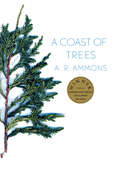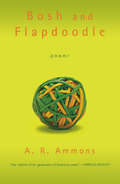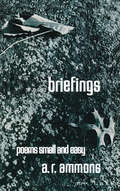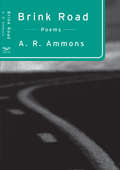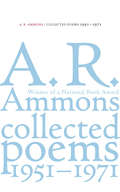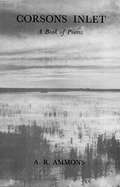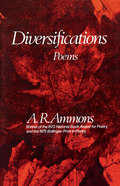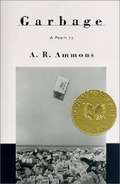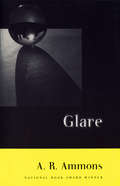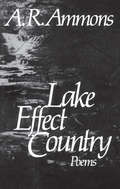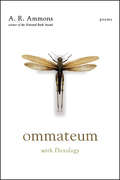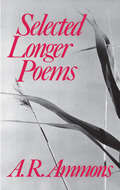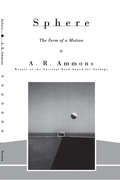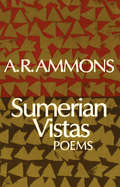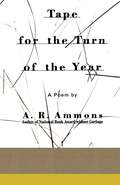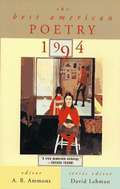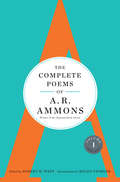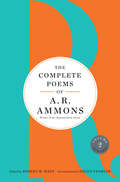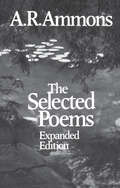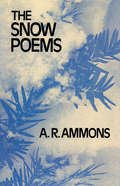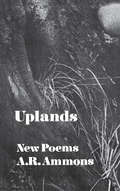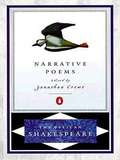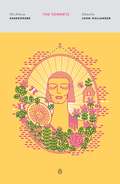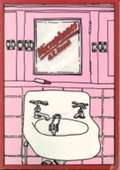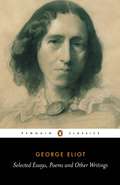- Table View
- List View
A Coast of Trees
by A. R. AmmonsThis collection of shorter poems won the National Book Critics Circle Award in 1981. Of this volume, the noted critic Harold Bloom has written, "A Coast of Trees represents A. R. Ammons at his strongest and most eloquent in the lyric mode. The book is an achievement fully comparable to his Uplands and Briefings. Among the poems likely to assume a permanent place in the Ammonsian (and American) canon are the majestic title lyric and 'Swells,' 'Easter Morning,' 'Keepsake,' 'Givings,' and 'Persistences.' Again Ammons has confirmed his vital continuities with the central Whitmanian tradition of our poetry, and his crucial place in that panoply."
Bosh and Flapdoodle: Poems
by A. R. Ammons"No other contemporary poet, in America, is likelier to become a classic than A. R. Ammons."—Harold Bloom Bosh and Flapdoodle is A. R. Ammons's last completed collection of poetry. Written over a six-week period, the book offers a series of candid, alternately hilarious and heartbreaking ruminations on age, illness, and death, while still finding room for the poet's always penetrating observations of daily life and natural events.
Briefings: Poems Small And Easy
by A. R. AmmonsBriefings brings together more than eighty short lyrics that, as Harold Bloom writes, "maintain an utterly consistent purity of detached yet radiant vision." Bloom continues, "There are other American poets since Stevens who have composed a handful of memorable poems, but only Ammons has begun to show us a whole poetic world. More than his contemporaries, he has perfected a voice that, to cite Emerson, is 'ready to render an image of every created thing.'" David Kalstone says, "The poems are, by and large, tough or wry meditations, striking out into strange landscapes, dreams or nightmares, which are seen with entire clarity, no blurring, as if this were the only way the mind could be unwound on the page. The book forms a journal of mental states, each poem finding a form and a scene for a very exact mental encounter of discovery. . . . 'Small and Easy' is the way everything is finally made to seem, like the rarest dancing, in which briefly and freshly the dancer shows us what space is like by showing how much he can possess."
Brink Road: Poems
by A. R. Ammons"No contemporary poet, in America, is likelier to become a classic than A. R. Ammons."—Harold Bloom With characteristic economy, A. R. Ammons writes that "Brink Road lies off NY 96 between Candor and Catatonk." The very name suggests that we are ever in transition from one state of mind to another always on the edge of revelation. The more than 150 poems in Brink Road date from 1973 to the present, dealing with Ammons's concerns with language, mortality, and the forces underlying the natural world. With elegance, wit, and ruminative gravity, Brink Road is an important addition to one of the most enduring bodies of poetry of our time.
Collected Poems, 1951-1971
by A. R. AmmonsA reissue of a body of work spanning two decades from one of our most treasured poets. "It will seem increasingly to many attentive readers that this volume—the most distinguished book of American verse, in my judgment, since the publication of Wallace Stevens's Collected Poems in 1955—marks the permanent establishment of a major visionary poet."—Harold Bloom "No mere gathering of poems, this collection is like one an explorer brings back."—David Kalstone
Corsons Inlet: A Book Of Poems
by A. R. AmmonsCorson's Inlet is A. R. Ammons's third book of poems. Consisting of some of his best early work, including such strikingly inventive poems as "Jungle Knot," "Coon Song," "Four Motions for the Pea Vines," and the title piece, this volume provides incontestable evidence of Ammons's rapid early growth as a poet, of his ever-broadening range and deepening perception. Corsons Inlet, like Ammons's Tape for the Turn of the Year, shows clearly his remarkable originality—and, more important, his lavish and unique poetic gifts.
Diversifications: Poems
by A. R. AmmonsDiversifications is a collection of shorter poems by the poet whose Collected Poems won the National Book Award. The poems are on a diversity of subjects, but through them all runs the strong unity of vision that has led critic Geoffrey Hartman to acclaim Ammons as "a major American poet" (New York Times Book Review). "If his importance was suspected before," wrote the poet John Ashbery in The New York Review of Books, "it is now confirmed." Ammons came late to poetry, and has come even more lately into national recognition. That recognition is solid, however, and can only be increased by this, his latest volume.
Garbage: A Poem
by A. R. AmmonsA book-length poem, "Garbage" is an epic of ideas: all life -- not that of human beings alone, but every species -- is shown to be part of an ultimate reality. Eternity is here and now. The argument ranges widely with a wealth of images taken from science, and the world around us, the writing by turns impassioned and witty. <P><P> Winner of the National Book Award
Glare: Poetry
by A. R. Ammons"Glare is a high-energy, relentlessly self-aware collision with the whole of life."--Albert Mobilio, Salon A superb long poem by the contemporary master of the form, Glare comprises two sections, "Strip" and "Scat Scan." The poem demonstrates, yet again, why A. R. Ammons's poetic voice is a national treasure: by turns cosmic, self-inflating, self-deflating, eloquent, intimate, bawdy, comic, precise--and always unmistakably his own.
Lake Effect Country: Poems
by A. R. AmmonsLake Effect Country is the newest collection by the poet whom the critic Josephine Jacobsen has described as "a formidable and outstandingly original contributor to the best of American poetry." Presenting the National Book Critics Circle Award in Poetry for 1981 to Ammons's A Coast of Trees Richard Locke, editor-in-chief of Vanity Fair, said, in part: "In the thirty years since A. R. Ammons published his first poems, he has fashioned a body of work that achieves a rare amplitude, specific gravity, and high seriousness. He is a poet of the American Sublime—a nature poet, as we say—standing in the tradition of Wordsworth, Emerson, and Whitman. Amidst the hue and cry of contemporary poetical factions, his work pursues its own integrity: clear, unblinking in its self-knowledge, remarkable for its radiant density of argument and feeling."
Ommateum: With Doxology: Poems
by A. R. Ammons“Oracular, almost biblical at times, and as deeply embedded in the particulars of nature as the superb later poetry.”—John Ashbery This reissue of A. R. Ammons’s debut, published five decades ago in a rare edition, with its penetrating “Whitmanian chants . . . holds in it the mystery of his gradual development into a major American poet, who will be read by the most discerning until the last syllable of recorded time” (Harold Bloom).
Selected Longer Poems
by A. R. AmmonsReaders already familiar with Ammons’s longer mode in other books will welcome this new collection, while those familiar only with the shorter poems will find their appreciation of his work both deepened and heightened. The Selected Poems: 1951-1977 was described by one critic as “an indispensable book”; Selected Longer Poems is an indispensable companion to it. The distinguished poet A. R. Ammons once described himself as, “not so much looking for the shape as being available to any shape that may be summoning itself through me from the self not mine but ours.” This “availability” has enabled his poetic genius to be at home in forms raging from brief lyrics—the best of which he brought together in The Selected Poems: 1951-1977—all the way to poems of full book length.
Sphere: The Form Of A Motion
by A. R. Ammons"There wasn't one page of his poem that didn't delight me."—Donald Davie, New York Review of Books Sphere is the second of A. R. Ammons's long poems—following Tape for the Turn of the Year and preceding Garbage—that mark him as a master of this particular form. The sphere in question is the earth itself, and Ammons's wonderfully stocked mind roams globally, ruminating on subjects that range from galaxies to gas stations. It is a remarkable achievement, comparable in importance to Wallace Stevens's Notes Toward a Supreme Fiction.
Sumerian Vistas: Poems
by A. R. AmmonsAmmons's poetic genius has always been at home in forms ranging from brief lyrics to longer works. In the present volume—the first since his highly acclaimed Lake Effect Country—readers will find superb examples of work in both forms. "The Ridge Farm," which begins the book, and "Tombstones," at its center, are fine longer meditations, while "Motion's Holdings," the concluding section, contains a number of his best new shorter poems. The book is proof, once again, that Ammons is one of our major American poets.
Tape for the Turn of the Year
by A. R. Ammons“This is the most surprising formal invention of a major innovator, is the fullest vision Ammons gives us of his enormous creative enterprise. Among the major descendents of Whitman’s Song of Myself, Tape occupies an essential imaginative space, showing us much about what is essential in the American poetic imagination.” —Harold Bloom In the form of a journal covering the period December 6, 1963, through January 10, 1964, A. R. Ammons’s long, thin poem was written on a roll of adding-machine tape, then transferred foot by foot to manuscript. He chose this method as a serious experiment in making a poem adapt to something outside itself. The tape determined both the length of the poem’s lines and when it ends. Tape for the Turn of the Year is a poem of infinite variety, blessed by the rich resources of one of this century’s greatest poets. By turns witty, serious, lyrical, and meditative, it is at once a superbly entertaining book and a significant literary achievement.
The Complete Poems of A. R. Ammons: Volume 1 1955-1977
by A. R. Ammons Helen Vendler Robert M. West“One of the great American poets . . . he sounds like nobody else.”—Helen Vendler “So I said I am Ezra / and the wind whipped my throat / gaming for the sounds of my voice. . . .” So begins one of the most remarkable oeuvres in the history of American poetry. The Complete Poems of A. R. Ammons, Volume I presents the first half of Archie Randolph Ammons’s long career, including the complete texts of his three book-length poems from that period: the verse diary Tape for the Turn of the Year, the Bollingen Prize–winning Sphere: The Form of a Motion, and the daring kaleidoscope of The Snow Poems, which late in life Ammons said of all his long poems was his favorite. Here are many of Ammons’s most widely celebrated lyrics and meditations, including “Corsons Inlet,” “Still,” “Gravelly Run,” and “The City Limits.” Others are more directly inspired by his roots in the rural south, among them “Nelly Myers,” “Silver,” and “Mule Song.” Here too are conversations with mountains (as in “Classic” and “Mountain Talk”) and exchanges with the wind (“The Wide Land” and “Mansion”), materialist explanations of reality (“Mechanism” and “Catalyst”) and prayers (such as the several poems titled “Hymn”). A poet drawn to theorizing about poetry, Ammons offers both sophisticated discussions of the art (as in “Poetics” and “Essay on Poetics”) and disarming assurance: “I believe in fun.” The text of each poem has been established after careful consideration of Ammons’s manuscripts and other prepublication materials. Endnotes detail the poems’ composition and publication histories, and also helpfully annotate references made within the poems. This volume confirms Richard Howard’s judgment: “Here was a great poet, surely one of the largest to speak among us.”
The Complete Poems of A. R. Ammons: Volume 2 1978-2005
by A. R. Ammons Helen Vendler Robert M. WestAn essential volume from “a master maker” (Richard Howard). “If you will sit with me in the light // of speech, I will sit with you. . . .” Readers who accept that invitation will find themselves in extraordinary company. The Complete Poems of A. R. Ammons, Volume II presents the second half of Archie Randolph Ammons’s long career, including the complete texts of his two book-length poems from that period: Garbage, for which he won his second National Book Award, and Glare, which drew special praise from the Academy of American Poets as it bestowed on him its highest honor, the Wallace Stevens Award. In addition, two appendices offer over one hundred and twenty previously uncollected poems dating from the 1950s to the late 1990s. Among this volume’s many highlights are celebrations of the natural world (such as “Hermit Lark” and “Lofty Calling”), poems of remembrance (as in “Chinaberry” and “Keeping Track”), prayers (“Singling & Doubling Together” and “Autonomy”), and compelling meditations on loss and mortality (such as “Easter Morning” and “In View of the Fact”). As in Volume I, the variety of scale is remarkable, ranging from the massiveness of Glare to the haiku-like brevity of “Pebble’s Story.” The text of each poem has been established after careful consideration of Ammons’s manuscripts and other prepublication materials. Endnotes detail the poems’ composition and publication histories, and also helpfully annotate references made within the poems. Celebrated poetry critic Helen Vendler’s introduction both humanizes Ammons and traces the growth of his outsized stature as a major poet, “unquestionably among the best-loved poets of our time” (David Lehman).
The Selected Poems (Expanded Edition): Nineteen Fifty One-nineteen Seventy Seven
by A. R. AmmonsA. R. Ammons's selection of his work once again, as the critic Harold Bloom wrote of the earlier version, "makes available the very best of him." To the "visions of clarity and terror" in that volume the poet now adds the most important poems from his three books published since. The resulting collection is the essential starting place for new readers, the quarry for those familiar with his work. Among the new poems is "Easter Morning," which the critic Helen Vendler called "a classic poem . . . a revelation."
The Snow Poems
by A. R. AmmonsThe Snow Poems is the most recent book of poetry by an author who has been called "perhaps the most imaginative, innovative poet writing today." Critics and readers alike recognize Ammons's achievements: in 1973, his Collected Poems won the National Book Award for Poetry; in 1975, his long poem Sphere: The Form of a Motion was nominated for the National Book Award and received the Bollingen Prize for Poetry: in 1977, he received and award from the American Academy and Institute of Arts and Letters. The Snow Poems, Ammons's twelfth book, is a major achievement by a major American Poet.
Uplands: New Poems
by A. R. AmmonsThis book collects many of the poems that A. R. Ammons wrote between 1964 and 1970. The poems here include brief lyrics and such longer works as "Summer Session 1968" and "Guitar Recicativos." The critic Harold Bloom writes, "With the publication of his Selected Poems (1968), soon after turning forty, A. R. Ammons quietly demonstrated a unique and central position in recent American poetry. . . . Recognition, as is always the case with a poetry difficult and central, has come slowly, but critics now begin to see in Ammons what he is: the maker of a body of poetry that fulfills Emerson's prophecy by addressing itself to life 'with sufficient plainness and with sufficient profoundness.'"
The Narrative Poems
by William Shakespeare Stephen Orgel A. R. Braunmuller Jonathan Crewe"I feel that I have spent half my career with one or another Pelican Shakespeare in my back pocket. Convenience, however, is the least important aspect of the new Pelican Shakespeare series. Here is an elegant and clear text for either the study or the rehearsal room, notes where you need them and the distinguished scholarship of the general editors, Stephen Orgel and A. R. Braunmuller who understand that these are plays for performance as well as great texts for contemplation." (Patrick Stewart) The distinguished Pelican Shakespeare series, which has sold more than four million copies, is now completely revised and repackaged. Each volume features: * Authoritative, reliable texts * High quality introductions and notes * New, more readable trade trim size * An essay on the theatrical world of Shakespeare and essays on Shakespeare's life and the selection of texts
The Sonnets
by William Shakespeare John Hollander Stephen Orgel A. R. BraunmullerTogether with A Lover's Complaint' and little-known alternative versions of four of the sonnets. Edited with an introduction by Stanley Wells. ...the most beautifully printed text available.'
Microphones
by A. R. KazukFrom Microphones there will be no returning to the standard detective story. This long poem/videotext ticks right along on its narrative marginalia alone, but its substance is an interplay of voices and its essence is high-density song.
Selected Essays, Poems and Other Writings
by George Eliot A. S. ByattThe works collected in this volume provide an illuminating introduction to George Eliot's incisive views on religion, art and science, and the nature and purpose of fiction. Essays such as 'Evangelical Teaching' show her rejecting her earlier religious beliefs, while 'Woman in France' questions conventional ideas about female virtues and marriage, and 'Notes on Form in Art' sets out theories of idealism and realism that she developed further in Middlemarch and Daniel Deronda. It also includes selections from Eliot's translations of works by Strauss and Feuerbach that challenged many ideas about Christianity; excerpts from her poems; and reviews of writers such as Wollstonecraft, Goethe and Browning. Wonderfully rich in imagery and observations, these pieces reveal the intellectual development of this most challenging and rewarding of writers.
